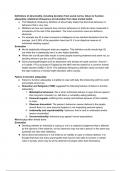Summary
Summary AQA A Level Psychology - Psychopathology Revision Notes
Unleash Your Understanding of Psychopathology with A-Level Psychology Revision Notes! Are you ready to explore the fascinating world of psychopathology and conquer your A-Level Psychology exams? Look no further! Our exceptional A-Level Psychology revision notes on the topic of psychopathology ...
[Show more]




